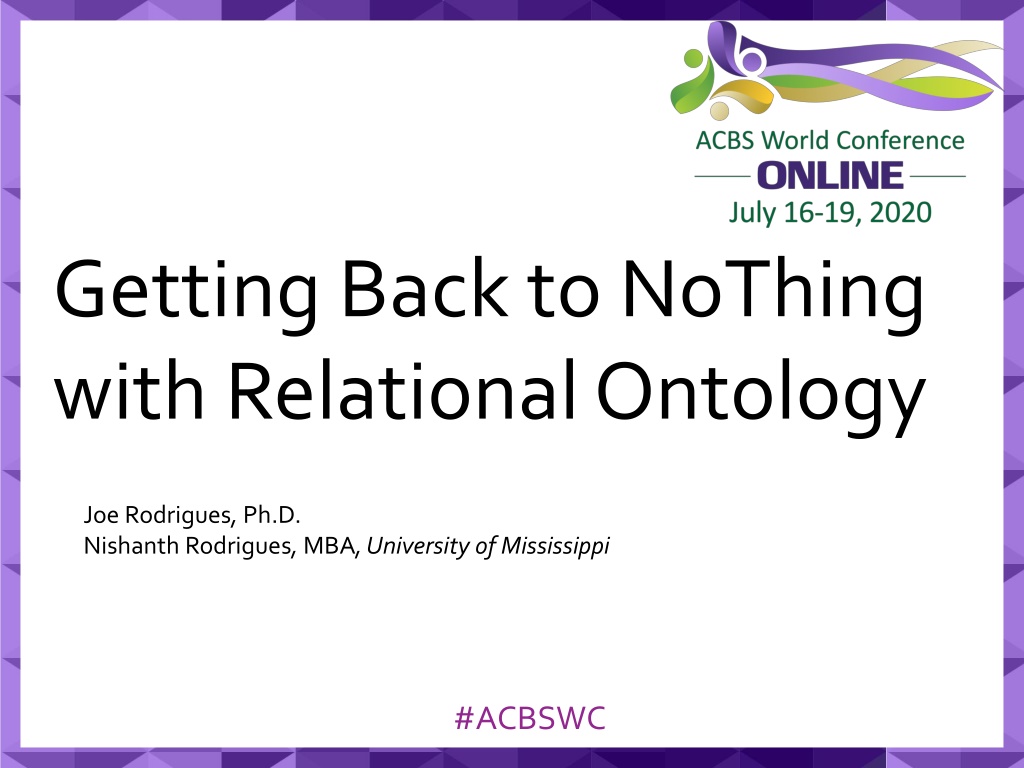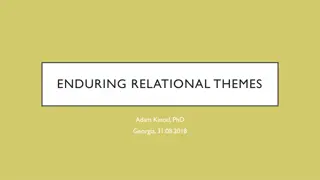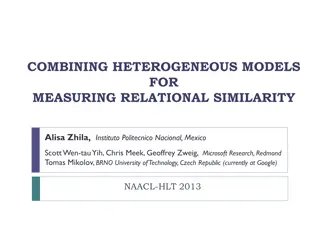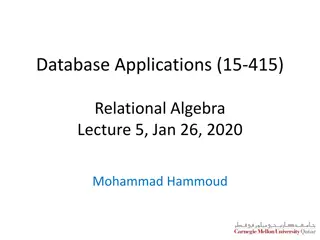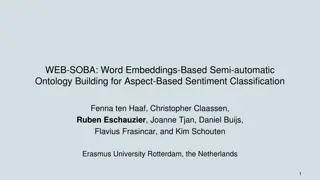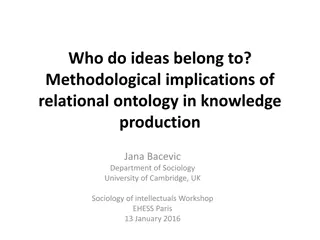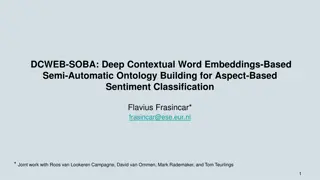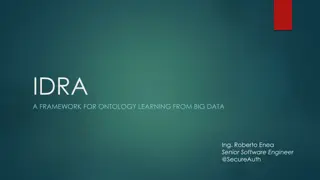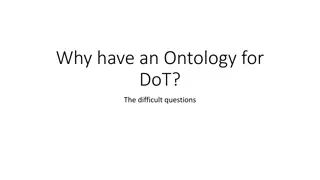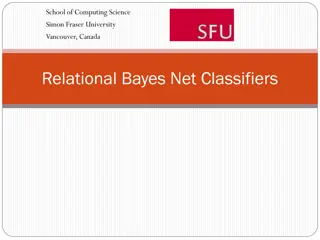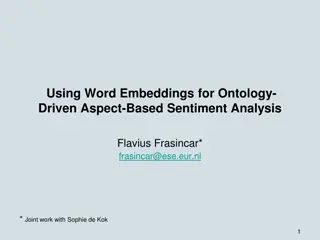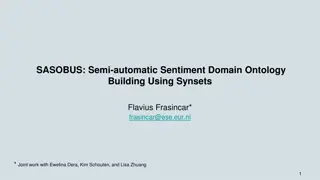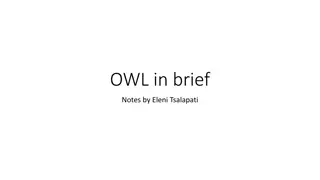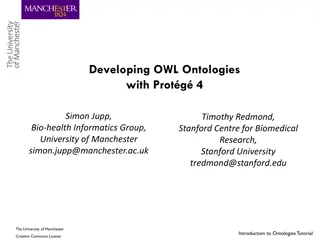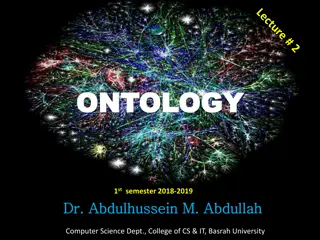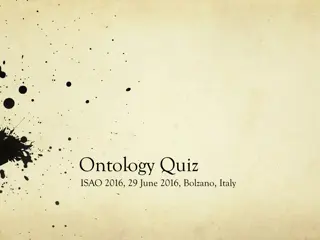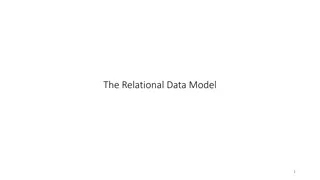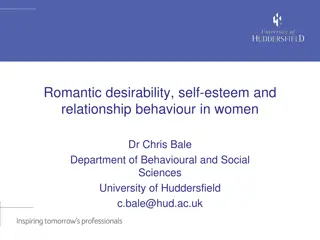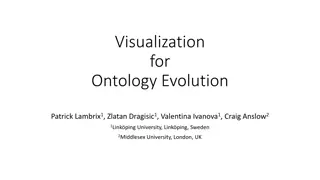Exploring Relational Ontology and Its Philosophical Implications
Delve into the fascinating realm of relational ontology, where concepts like the nature of existence, the essence of things, and the interconnectedness of all are dissected. From traditional Western perspectives to Eastern philosophies, this exploration challenges conventional views on reality, emphasizing the fundamental role of relationships in shaping our understanding of the world.
Download Presentation

Please find below an Image/Link to download the presentation.
The content on the website is provided AS IS for your information and personal use only. It may not be sold, licensed, or shared on other websites without obtaining consent from the author. Download presentation by click this link. If you encounter any issues during the download, it is possible that the publisher has removed the file from their server.
E N D
Presentation Transcript
Getting Back to NoThing with Relational Ontology Joe Rodrigues, Ph.D. Nishanth Rodrigues, MBA, University of Mississippi #ACBSWC
Ontological Quandaries The Importance of Ontology for a Philosophy of Science
Ontology The Study of What There Is Subsumed under Metaphysics (Corr, 1975) Originally Ontosophia, replaced by Ontology (Lorhard, 1606; Deveaux & Lamanna, 2009) Allegory of the Cave (Elliot, 1967) Shadows on the Wall Split between being and becoming Whitehead on Plato The safest general characterization of the European philosophical tradition is that it consists of a series of footnotes to Plato (1979) Essences of Aristotle (Creswell, 1971) Descartes Soul
Eastern Ontology Vedic Thought Rig Veda (Frawley, 2014) Levels Avdaita Vedanta (Bartley, 2011) All is Brahman Buddhist Thought Dependent or Relational Origination in Nagarjuna s M lamadhyamakak rik (Garfield, 2005) Nothing is Independent of Other Things
On Relations Poincare (1902) Now, we daily see what science is doing for us. This could not be unless it taught us something about reality; the aim of science is not things themselves, as the dogmatists in their simplicity imagine, but the relations between things; outside those relations there is no reality knowable. Our Cultural Heritage is Subtantivist Ontology The World of Things is Easier to Track Many from One Origin Stories Relations, like Actions, are Ephemeral Difficult to Track Carriers Required
Relational Ontology Do We Start with One or More? The Plural Event suggests that at the Origin there was More than One (Benjamin, 1993) We Begin with Multiple Relations Singularity is an After-Effect (Benajmin, 2015) It is Secondary and Comes About through the Effacing of a Founding Plural Event What is a Thing? The Idealism of Plato and the Essences of Aristotle Run Aground Correspondence and Realism Have their Own Issues Reductionism is always Close at Hand Substantivist Ontologies In-Betweeness as a Way Out The World is Fundamentally Relational All Relations are Internal
Relational Ontology A Transpolar view away from Idealism-Realism and Subject- Object Given any classical entitative polarities, fundamentality is to be assigned to their relation. (Oliver, 1981) A Relation beween a and b, can be indicated by aRb, where a and b are what they are by virtue of their relation Not ArB It is the Actions that are Primary The things are derived from the Action E.g., i-SEE-light Being in Relation (always) Relations not Relation If the One World is Composed of Relations Carving Up the World for Analysis Our Subject Matter is Relations Compound Relations Returning to Calvin Realism, Pragmatism, and Relationism
Radical Behavioral Approaches Behavior Focused Premack Principle (1959) High Probability Behaviors can Reinforce Low Probability Behaviors Behaviors Reinforce other Behaviors Matching Law (Baum, 2016) Choice between Two or More Options Rates of Responding typically match Rates of Reinforcement Timberlake s Behavior Systems Theory (1994) Response Deprivation (Timberlake & Allison, 1974) Low Probability Behaviors can Reinforce High Probability Behaviors if Depressed below Baseline Reinforcement and Punishment can be Reversed
Radical Behavioral Approaches Environment Focused Contingency Based 3-Term Contingency: Antecedent-Behavior-Consequence Light -> Lever Press -> Food Antecedents become Discriminative Stimuli Consequences select Behavior Stimulus Functions Affect Behavior Behavior has Functions too Can be Interpreted as Behavior Focused E.g., A-B-C: Light Press Lever Food A: Organism SEE Light B: Organism PRESS Lever C: Organism CONSUME Food Note the Relational character of Behavior above BEHAVIOR is the Relation between an Organism and the Environment o-B-e is then Related to Other o-B-es
Behavior (Relations) as Fundamental Behavior brings Things (Relata) into Relation Observing is Behavior Knowledge of Relata is Derived Stimulus Functions are Derived from Behavior Organismic Perspective Behaviors as Activities, e.g., movie watching, dining out, etc. Repertoire as a Network More appropriate to Verbal Behavior and its Generalizability Experiential Exercises, Mindfulness, Self-Compassion The Effects of Relating Relating Orienting Evoking (ROE) (Barnes-Holmes et al., in press) Composite Relation
Behavior is Related to Behavior Behavior (as a Relation) Affects other Behavior Behavior can Promote or Enable or Afford other behavior Behavior can Diminish other behavior The Behavioral Event is as Long as the Relations under scrutiny From the First Behavior to the Last Behavior under study From Hearing a Rule to Following a Rule for the Tenth time All the Behavior in Between has an Impact on the Last Behavior Behavioral Networks Avoids Organismic States and Endowing Stimuli with Powers
Example Intervention Pilot Study on Clients with OCD (McFall, Allison, Viken, & Timberlake, 2019) 19 Participants received Response Disequilibrium Therapy (RDx) Participants took Baseline Measures of two Positive Behaviors (e.g., time spent watching TV) and Target Behavior (e.g., hand washing) Positive Behavior was made Contingent on Reducing Target Behavior (typically by 50%) 15-minute Sessions consisting of going over the Data from the Previous Week and setting New Targets Results were comparable to 7 Clients receiving ERP Small sample, mixed-group, pilot #ACBSWC
Modeling Relations Hoffman, Curtiss, & Hayes, 2020 #ACBSWC
Modeling Interventions Within Relations Hoffman, Curtiss, & Hayes, 2020
What Does a Relational Ontology offer Functional Contextualism? Not a Substantivist Ontological Commitment Orients One to Actions, not Things Behavior is Considered in Context Fundamental Unit is Relations e.g., between Organism and Environment (o- B-e) and between o-B-es Functional Relations still Stand, as Relations Between Behaviors Truth Criterion of Successful Working can be viewed as a Relation between Behaviors that Enable the Goal Behavior RO is Behavior Focused instead of Environment Focused CBS Interventions Focus on Generalized Behaviors The One World is the World of Relations (and the Derived Relata) In and With the One World Self Derived through Action Thinking Relationally
Maybe Im Onto Something?
